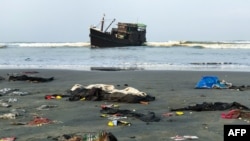Malaysia is using COVID-19 as an excuse to reject Rohingya Muslim refugees, human rights groups say, bringing flashbacks of 2015 when boat refugees died after escaping Myanmar in what the United Nations called “floating coffins.”
The Malaysian military confirmed it had turned back at least one “suspicious boat” full of Rohingya Friday, though Amnesty International said it had received information that there are a handful of other boats in limbo, possibly heading to Malaysia and Thailand.
“Refusing to help the people on these boats would not be willfully blind, it would be consciously making their plights even worse,” Clare Algar, senior director for research, advocacy and policy at Amnesty International, said.
She added, “The battle against COVID-19 is no excuse for regional governments to let their seas become graveyards for desperate Rohingya people.”
The nearly 400 refugees were then rescued by Bangladesh after almost two months at sea, but 30 others may have died on the journey, according to the UN High Commissioner for Refugees. The agency said the Rohingya were malnourished and in need of medical care.
When turning away the refugee boat, Kuala Lumpur said it was merely enforcing its “movement control order,” one of the measures to fight the virus that also included thousands of arrests of citizens and a crackdown on speech.
The pandemic has left refugees vulnerable to infection around the world. In Greece, activists want the government to evacuate the refugee camp on Lesbos island, which is holding seven times the number of people allowed. In Guatemala, the government has stopped receiving deportation flights from the United States after dozens of asylum seekers returned to the Central American country infected.
Malaysia had the most COVID-19 cases in Southeast Asia last month, but it has since been narrowly surpassed by Indonesia, the Philippines, and Singapore. However, Algar noted that Malaysia can both carry out its international refugee duties, while at the same time also fighting the pandemic. She pointed to another boat full of Rohingya that Malaysia brought to shore earlier this month. The Muslim majority country has taken in those more than 200 refugees, including putting them in quarantine, without harming the rest of the population.
The Rohingya have been fleeing from Myanmar for years, where the Buddhist majority has engaged in what the United Nations referred to as a "textbook example of ethnic cleansing.”
“Haven’t the people of Rakhine State suffered enough?” Maria Chin Abdullah, a Malaysian Member of Parliament, said last month, referring to the region in Myanmar where Rohingya live. “Recent years have brought nothing but pain and violence for the communities there.”
Boats believed to be carrying refugees have also been spotted off the coast of Thailand, which is sandwiched in between Myanmar and Malaysia, according to Amnesty International. Bangkok has not said whether it will accept any of the Rohingya refugees coming by boat if they arrive in Thailand. The country, which was the first outside China to report a case of COVID-19, had 2,765 cases and 47 deaths as of Monday, while Malaysia had 5,305 cases and 88 deaths, according to data compiled by the World Health Organization.
